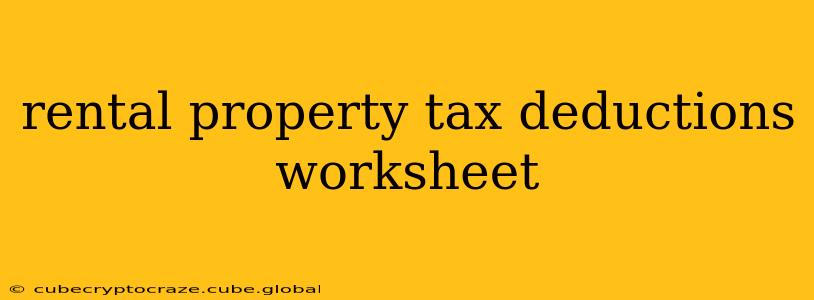Landlords and real estate investors know that owning rental properties comes with significant financial responsibilities. However, the IRS allows for several tax deductions to offset some of these expenses. Navigating these deductions can feel overwhelming, but this worksheet will guide you through the process, helping you maximize your deductions and minimize your tax burden. Remember, this is for informational purposes only and is not a substitute for professional tax advice. Always consult with a tax professional to ensure accuracy and compliance.
What Expenses Are Deductible?
Before diving into the worksheet, let's understand the types of rental property expenses you can deduct. These are generally categorized as either direct or indirect expenses.
Direct Expenses: These are costs directly associated with the operation and maintenance of your rental property. Examples include:
- Mortgage Interest: The interest portion of your mortgage payments.
- Property Taxes: Real estate taxes levied on the property.
- Insurance Premiums: Costs associated with homeowner's or landlord insurance.
- Repairs and Maintenance: Costs for fixing and maintaining the property (excluding capital improvements).
- Depreciation: A deduction that allows you to recover the cost of the property over its useful life.
- Advertising: Costs associated with finding tenants.
- Cleaning and Supplies: Costs to maintain the property's cleanliness.
Indirect Expenses: These are expenses that indirectly benefit your rental property. Examples include:
- Accounting Fees: Fees paid for professional tax preparation services related to your rental property.
- Legal and Professional Fees: Costs associated with managing legal matters concerning your rental property.
- Travel Expenses: Costs related to inspecting or managing the property (if it's not your primary residence).
Rental Property Tax Deductions Worksheet: A Step-by-Step Guide
This worksheet will help you organize your expenses. Keep accurate records of all expenses throughout the year, including receipts and bank statements.
Section 1: Rental Income
- Gross Rental Income: Total rent received during the tax year. [$__________]
- Less: Vacancy Losses: Periods where the property was vacant. [$__________]
- Less: Other Income Deductions (e.g., rent concessions): [$__________]
- Total Rental Income (Line 1 - Line 2 - Line 3): [$__________]
Section 2: Rental Expenses
For each expense category, list the total amount incurred during the tax year.
| Expense Category | Amount |
|---|---|
| Mortgage Interest | [$__________] |
| Property Taxes | [$__________] |
| Insurance Premiums | [$__________] |
| Repairs and Maintenance | [$__________] |
| Depreciation | [$__________] |
| Advertising | [$__________] |
| Cleaning and Supplies | [$__________] |
| Utilities (if paid by landlord) | [$__________] |
| Accounting Fees | [$__________] |
| Legal and Professional Fees | [$__________] |
| Travel Expenses | [$__________] |
| Other Expenses (Specify): | [$__________] |
| Total Rental Expenses: | [$__________] |
Section 3: Calculating Net Rental Income/Loss
- Total Rental Income (from Section 1, Line 4): [$__________]
- Total Rental Expenses (from Section 2): [$__________]
- Net Rental Income/Loss (Line 1 - Line 2): [$__________]
Important Considerations:
- Depreciation: Calculating depreciation can be complex. You'll need to determine the property's useful life and salvage value. Consult a tax professional for guidance.
- Passive Activity Rules: If your rental activity is considered a "passive activity," there are limitations on deducting losses against other income.
- Record Keeping: Meticulous record-keeping is crucial. Keep all receipts, invoices, and bank statements organized for easy access during tax season.
Frequently Asked Questions (FAQs)
Can I deduct the cost of capital improvements?
No, you cannot deduct the cost of capital improvements in the year they are made. Capital improvements are permanent enhancements that increase the value or useful life of the property. Instead, they are added to the property's basis and depreciated over time.
What is the difference between repairs and capital improvements?
Repairs are relatively minor fixes that maintain the property's condition, while capital improvements are major renovations that extend its life or increase its value. Replacing a broken window is a repair; adding a new wing to the building is a capital improvement.
Can I deduct losses from my rental property?
You can deduct rental losses up to a certain limit against other income, depending on whether your rental activity is considered a passive activity. Passive activity losses are generally only deductible against passive activity income.
How do I calculate depreciation for my rental property?
Depreciation is calculated using the property's adjusted basis (cost of the property, plus improvements, less depreciation already taken), useful life (typically 27.5 years for residential rental property), and salvage value (estimated value at the end of its useful life). There are several methods for calculating depreciation, including the straight-line method.
This worksheet provides a basic framework for calculating rental property tax deductions. For specific guidance tailored to your situation, consulting with a tax professional is strongly recommended. They can help you navigate the complexities of tax laws and ensure you claim all eligible deductions. Remember to always keep accurate and detailed records of all your rental income and expenses.
